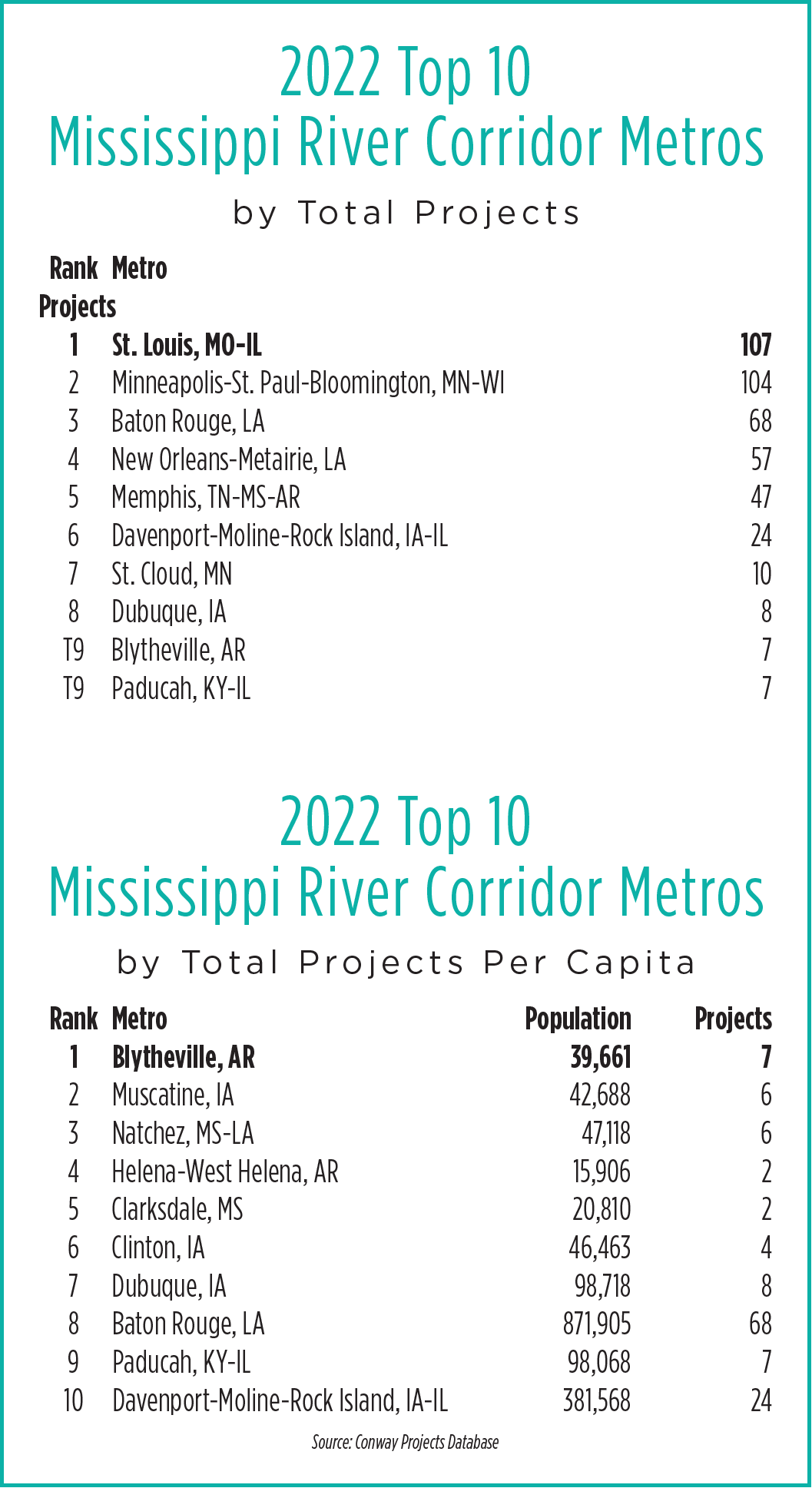This isn’t just an investment in our facilities, it’s an investment in our hometown community.”
Those were the words of Brendan Whitworth, CEO of Anheuser-Busch, when Anheuser-Busch last spring announced a $50 million investment in its signature St. Louis brewery as part of the company’s 2021 commitment to invest $1 billion in its facilities across 26 states over two years.
“St. Louis is our hometown and plays a critical role in enabling our innovations and producing the highest-quality products for our consumers to enjoy,” Whitworth said, noting the national investment plan’s goal of “supporting our local communities by creating and sustaining jobs as our nation continues to navigate the economic recovery.”
By all indications, St. Louis is recovering just fine.
With 107 projects, the bi-state St. Louis metro region has eked out a win over the bi-state region of Minnesota’s Twin Cities to rank No. 1 in this year’s Mississippi River Corridor rankings, which examine corporate end-user facility investments over an 18-month period in every metro and micropolitan area along the entire river’s length.
“We take an immense amount of pride in our longstanding history here in St. Louis, and this investment epitomizes our deep commitment to our community and to the broader beer industry,”said Jim Bicklein, general manager of the St. Louis brewery. The company’s St. Louis campus late in 2022 also welcomed a new technical training center that added more jobs to the local roster of more than 3,000 — 16% of the company’s 19,000 U.S. employees. One of its central purposes is to reduce technical skills gaps and provide a training roadmap across the brewer’s national portfolio of more than 120 facilities. Anheuser-Busch has plans to expand the curriculum to additional locations next year, including its breweries in Cartersville, Georgia, and Houston, Texas.
Specifics of Anheuser-Busch’s brewery investment include advanced technical equipment that allows for the streamlined addition of flavors to the seltzer liquid.
You might say the Greater St. Louis economy is fizzing with a multitude of its own flavors. Corporate facility projects during the 18-month period examined included Boeing’s $300 million, 200-job investment in Mascoutah, Illinois (as well as a project in St. Charles, Missouri); 8th Avenue Food & Provisions’ $50 million, 300-job investment in Hazelwood, Missouri; and Thermo Fisher Scientific’s $82 million, 169-job project in Berkeley, Missouri.
Big Times in Blytheville and Mississippi County
When analyzed by projects per capita, the project data identify the micropolitan area of Blytheville and Mississippi County, Arkansas, as the No. 1 region on the river, just ahead of Muscatine, Iowa, and Natchez, Mississippi-Louisiana, with fellow Arkansas metro Helena-West Helena coming in at No. 4 and Clarksdale, Mississippi, rounding out the top five.
The Mississippi County economy is still riding the impressive wave of steelmaking investment that helped boost the region to this same No. 1 per capita ranking in March 2020. Projects include investments by Zekelman Industries, Chime Solutions and Sierra Group & Associates Constrution in Blytheville proper; Majestic Steel’s $65 million, 225-job investment in Armorel and U.S. Steel’s $3 billion, 900-job investment in Osceola. That’s the same town that’s welcoming a $280.7 million, 800-job project from Envirotech Vehicles and a $500 million, 200-job project announced by steel mini mill company Highbar Partners in November 2022.
The Highbar mill — the first of two planned mini mills that will focus on sustainable scrap metal recycling and steel production — will sit on over 600 acres of property and include space for an expanded Mississippi River port facility, a direct Class I railroad connection and a planned adjacent solar installation.
“My team and I have had great success investing billions of dollars in northeast Arkansas over the past eight years. I am pleased that after conducting a multi-state site search that we are able to make this announcement today,” said Dave Stickler, CEO of Highbar and senior managing partner of Global Principal Partners. “Arkansas is a great place to conduct business, especially steel business.”
Construction of U. S. Steel’s non-grain oriented (NGO) electrical steel finishing line its Big River Steel complex in Osceola, Arkansas is proceeding as planned, with expected completion later this year. The company notes NGO electrical steel grades are essential to electric vehicle production, and the steel finished on the NGO line will support the growing demand for these products among the nation’s largest automakers. Steels from the facility will also assist manufacturers looking for sustainable steels to meet their green energy needs, the company says.
“Once completed, our NGO line at Big River Steel will allow us to continue meeting our customers’ growing demand for steel that is best for people and planet,” said U. S. Steel Senior Vice President – Advanced Technology Steelmaking & COO Daniel R. Brown. “The construction of our NGO line is another step in the evolution of our Big River Steel facility in Osceola. We believe that the future of steelmaking is here, and we are excited for what’s ahead.”


